
Generative-AI-for-beginners-dotnet
Five lessons, learn how to really apply AI to your .NET Applications
Stars: 907
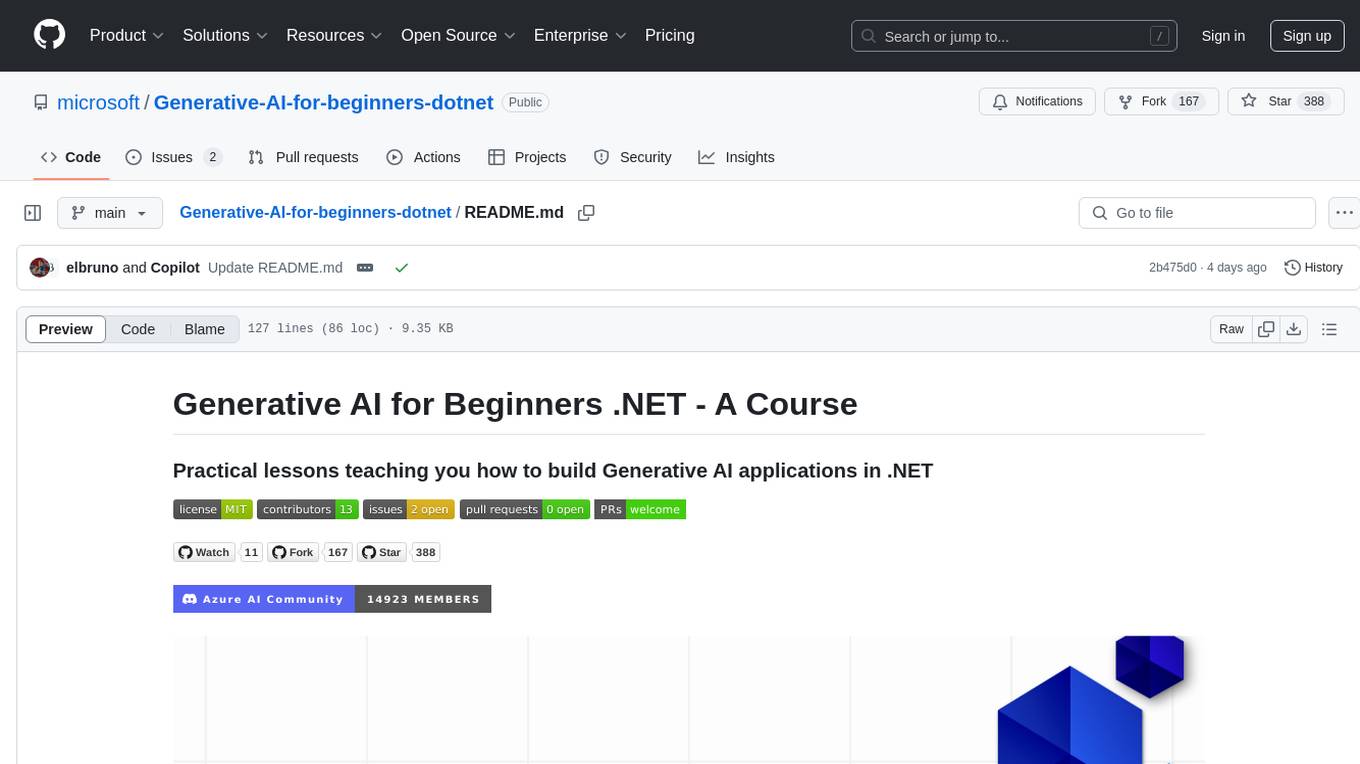
Generative AI for Beginners .NET is a hands-on course designed for .NET developers to learn how to build Generative AI applications. The repository focuses on real-world applications and live coding, providing fully functional code samples and integration with tools like GitHub Codespaces and GitHub Models. Lessons cover topics such as generative models, text generation, multimodal capabilities, and responsible use of Generative AI in .NET apps. The course aims to simplify the journey of implementing Generative AI into .NET projects, offering practical guidance and references for deeper theoretical understanding.
README:
Welcome to Generative AI for Beginners .NET, the hands-on course for .NET developers diving into the world of Generative AI!
This isn’t your typical “here’s some theory, good luck” course. This repository is all about real-world applications and live coding to empower .NET developers to take full advantage of Generative AI.
This is hands-on, practical, and designed to be fun!
Don't forget to star (🌟) this repo to find it easier later.
➡️Get your own copy by Forking this repo and find it next in your own repositories.
We're constantly improving this course with the latest AI tools and models:
-
MCP Library Integration: We've integrated the Model Context Protocol C# SDK to provide a standardized way to communicate with AI models across different providers. This allows for more consistent model interactions while reducing provider lock-in. Check our samples in the Core Techniques section!
- 5 min video overview of an Aspire + MCP demo
- Sample code for the video in the 04-PracticalSamples/src/Aspire.MCP.Sample.sln solution.
View all previous updates in our What's New section
Generative AI is transforming software development, and .NET is no exception. This course aims to simplify the journey by offering:
- Short 5-10 minute videos for each lesson.
- Fully functional .NET code samples you can run and explore.
- Integration with tools like GitHub Codespaces and GitHub Models for seamless setup and fast time-to-code. But if you want to run the samples locally with your own models, you can totally do that too.
You'll learn how to implement Generative AI into .NET projects, from basic text generation to building full-fledged solutions using GitHub Models, Azure OpenAI Services and local models with Ollama.
- Short Video: A quick overview of the lesson (5-10 minutes).
- Complete Code Samples: Fully functional and ready to run.
- Step-by-Step Guidance: Simple instructions to help you learn and implement the concepts.
- Deep Dive References: This course focuses on the practical implementation of GenAI, to get deeper into the theoretical we also provide links to explanations in Generative AI for Beginners - A Course when needed.
| # | Lesson Link | Description |
|---|---|---|
| 01 | Intro to Generative AI Basics for .NET Developers |
|
| 02 | Setting Up for .NET Development with Generative AI |
|
| 03 | Core Generative AI Techniques with .NET |
|
| 04 | Practical .NET Generative AI Samples |
|
| 05 | Responsible Use of Generative AI in .NET Apps |
|
| Language | Code | Link to Translated README | Last Updated |
|---|---|---|---|
| Chinese (Simplified) | zh | Chinese Translation | 2025-02-19 |
| Chinese (Traditional) | tw | Chinese Translation | 2025-02-19 |
| French | fr | French Translation | 2025-02-19 |
| Japanese | ja | Japanese Translation | 2025-02-19 |
| Korean | ko | Korean Translation | 2025-02-19 |
| Portuguese | pt | Portuguese Translation | 2025-02-19 |
| Spanish | es | Spanish Translation | 2025-02-19 |
| German | de | German Translation | 2025-02-19 |
To get started, you'll need:
-
A GitHub account (free is fine!) to fork this entire repo to your own GitHub account.
-
GitHub Codespaces enabled for instant coding environments. You can enable GitHub Codespaces in your repository settings. Learn more about GitHub Codespaces here.
-
Create your copy by Forking this repo, or use the
Forkbutton at the top of this page. -
A basic understanding of .NET development. Learn more about .NET here.
And that's it.
We've designed this course to be as low-friction as possible. We make use of the following to help you get started quickly:
- Run in GitHub Codespaces: With one click, you'll get a pre-configured environment to test and explore the lessons.
- Leverage GitHub Models: Try out AI-powered demos hosted directly within this repo, we explain more in the lessons, as we go. (If you want to learn more about GitHub Models, click here)
Then when you're ready to expand we also have guides for:
- Upgrading to Azure OpenAI Services for scalable and enterprise-ready solutions.
- Using Ollama to run models locally on your hardware for enhanced privacy and control.
Contributions are welcome! Here's how you can help:
-
Report issues or bugs in the repo.
-
Improve existing code samples or add new ones, fork this repo and propose some changes!
-
Suggest additional lessons or enhancements.
-
Do you have suggestions or found spelling or code errors?, create a pull request
Check the CONTRIBUTING.MD file for details on how to get involved.
This project is licensed under the MIT License - see the LICENSE file for details.
We have a lot of other content to help your learning journey. Check out:
- Generative AI for Beginners
- Generative AI for Beginners .NET
- Generative AI with JavaScript
- AI for Beginners
- AI Agents for Beginners - A Course
- Data Science for Beginners
- ML for Beginners
- Cybersecurity for Beginners
- Web Dev for Beginners
- IoT for Beginners
- XR Development for Beginners
- Mastering GitHub Copilot for Paired Programming
- Mastering GitHub Copilot for C#/.NET Developers
- Choose Your Own Copilot Adventure
- Phi Cookbook: Hands-On Examples with Microsoft's Phi Models
For Tasks:
Click tags to check more tools for each tasksFor Jobs:
Alternative AI tools for Generative-AI-for-beginners-dotnet
Similar Open Source Tools

Generative-AI-for-beginners-dotnet
Generative AI for Beginners .NET is a hands-on course designed for .NET developers to learn how to build Generative AI applications. The repository focuses on real-world applications and live coding, providing fully functional code samples and integration with tools like GitHub Codespaces and GitHub Models. Lessons cover topics such as generative models, text generation, multimodal capabilities, and responsible use of Generative AI in .NET apps. The course aims to simplify the journey of implementing Generative AI into .NET projects, offering practical guidance and references for deeper theoretical understanding.

biochatter
Generative AI models have shown tremendous usefulness in increasing accessibility and automation of a wide range of tasks. This repository contains the `biochatter` Python package, a generic backend library for the connection of biomedical applications to conversational AI. It aims to provide a common framework for deploying, testing, and evaluating diverse models and auxiliary technologies in the biomedical domain. BioChatter is part of the BioCypher ecosystem, connecting natively to BioCypher knowledge graphs.

co-op-translator
Co-op Translator is a tool designed to facilitate communication between team members working on cooperative projects. It allows users to easily translate messages and documents in real-time, enabling seamless collaboration across language barriers. The tool supports multiple languages and provides accurate translations to ensure clear and effective communication within the team. With Co-op Translator, users can improve efficiency, productivity, and teamwork in their cooperative endeavors.
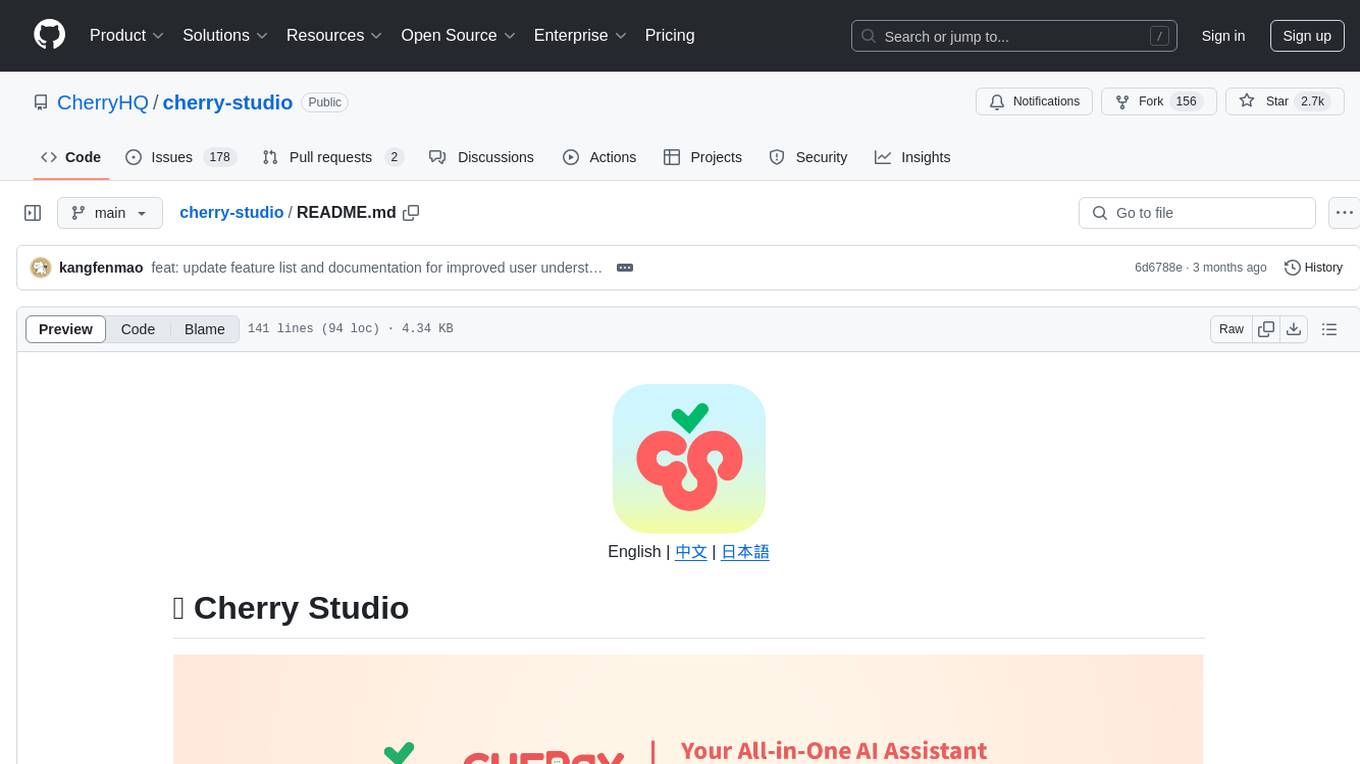
cherry-studio
Cherry Studio is a desktop client that supports multiple LLM providers on Windows, Mac, and Linux. It offers diverse LLM provider support, AI assistants & conversations, document & data processing, practical tools integration, and enhanced user experience. The tool includes features like support for major LLM cloud services, AI web service integration, local model support, pre-configured AI assistants, document processing for text, images, and more, global search functionality, topic management system, AI-powered translation, and cross-platform support with ready-to-use features and themes for a better user experience.

mage-ai
Mage is an open-source data pipeline tool for transforming and integrating data. It offers an easy developer experience, engineering best practices built-in, and data as a first-class citizen. Mage makes it easy to build, preview, and launch data pipelines, and provides observability and scaling capabilities. It supports data integrations, streaming pipelines, and dbt integration.
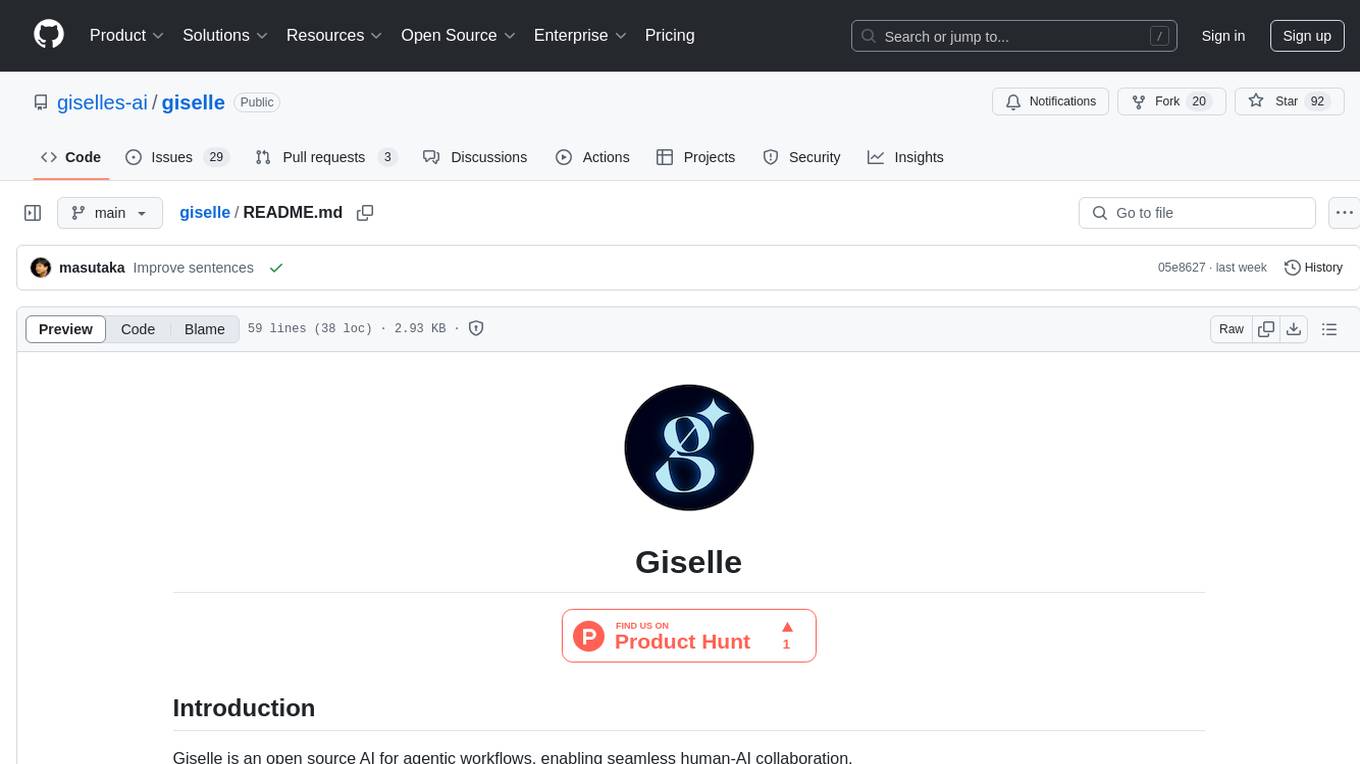
giselle
Giselle is an open source AI tool designed for agentic workflows, facilitating seamless collaboration between humans and AI. It offers cloud hosting with free agent time, self-hosting options, and a Vibe Cording Guide for using AI coding assistants. Giselle is suitable for developers and non-engineers alike, empowering users to leverage AI capabilities without extensive coding knowledge. The tool is actively developed, with a roadmap in progress, and welcomes contributions from the community under the Apache License Version 2.0.
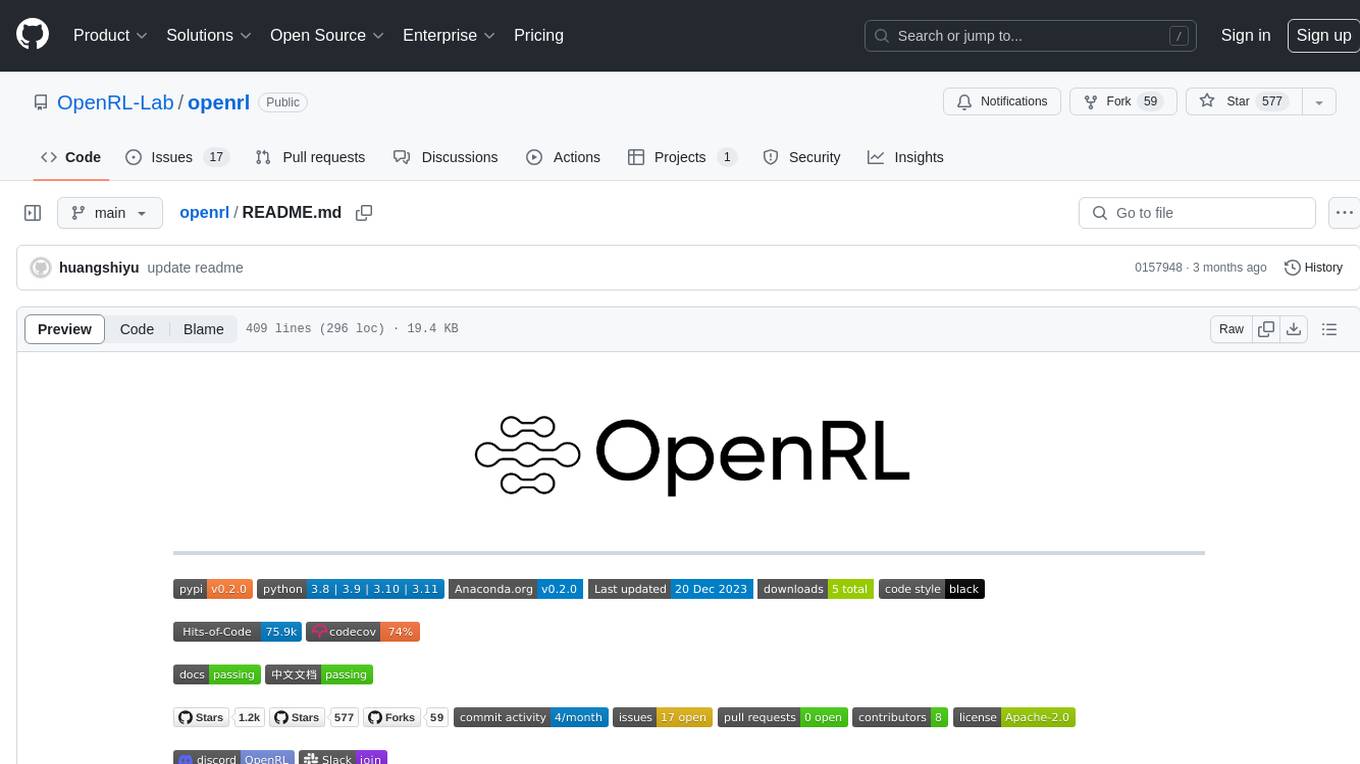
openrl
OpenRL is an open-source general reinforcement learning research framework that supports training for various tasks such as single-agent, multi-agent, offline RL, self-play, and natural language. Developed based on PyTorch, the goal of OpenRL is to provide a simple-to-use, flexible, efficient and sustainable platform for the reinforcement learning research community. It supports a universal interface for all tasks/environments, single-agent and multi-agent tasks, offline RL training with expert dataset, self-play training, reinforcement learning training for natural language tasks, DeepSpeed, Arena for evaluation, importing models and datasets from Hugging Face, user-defined environments, models, and datasets, gymnasium environments, callbacks, visualization tools, unit testing, and code coverage testing. It also supports various algorithms like PPO, DQN, SAC, and environments like Gymnasium, MuJoCo, Atari, and more.
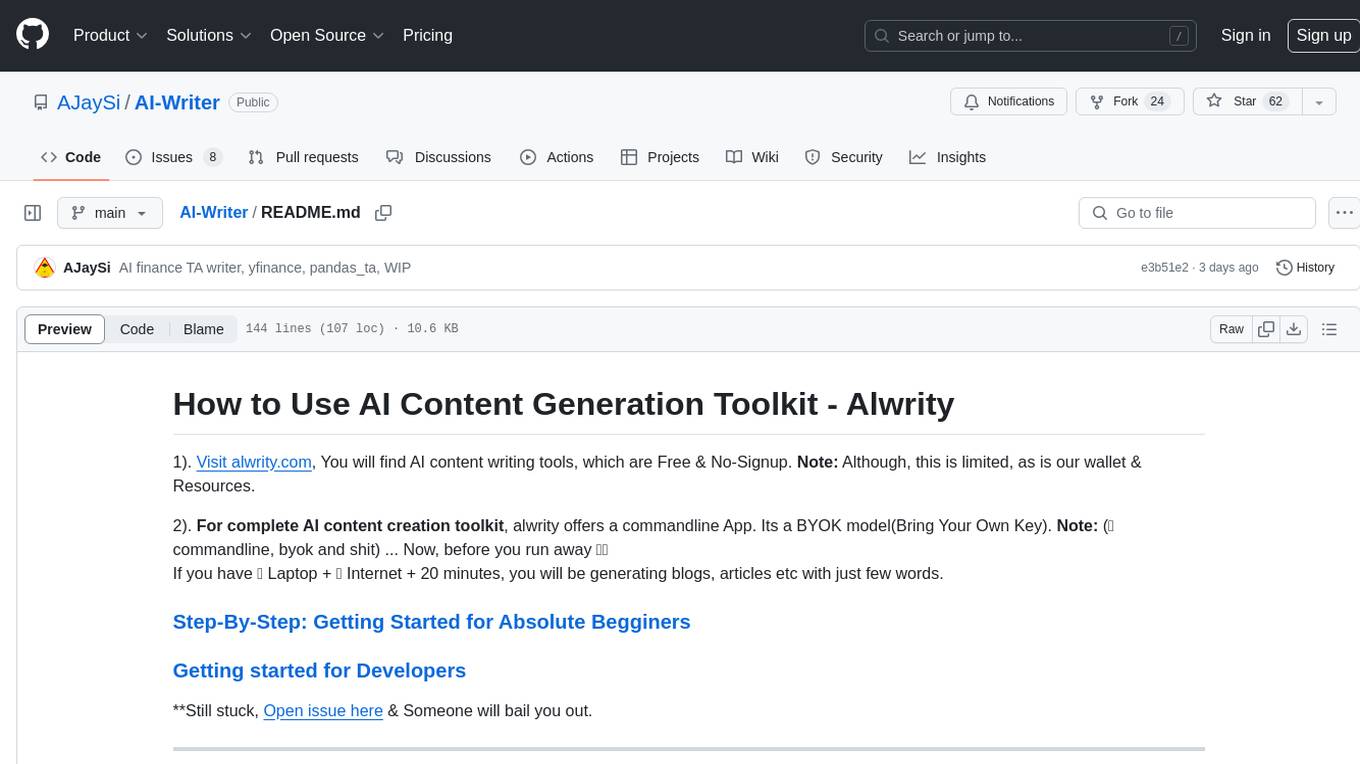
AI-Writer
AI-Writer is an AI content generation toolkit called Alwrity that automates and enhances the process of blog creation, optimization, and management. It integrates advanced AI models for text generation, image creation, and data analysis, offering features such as online research integration, long-form content generation, AI content planning, multilingual support, prevention of AI hallucinations, multimodal content generation, SEO optimization, and integration with platforms like Wordpress and Jekyll. The toolkit is designed for automated blog management and requires appropriate API keys and access credentials for full functionality.
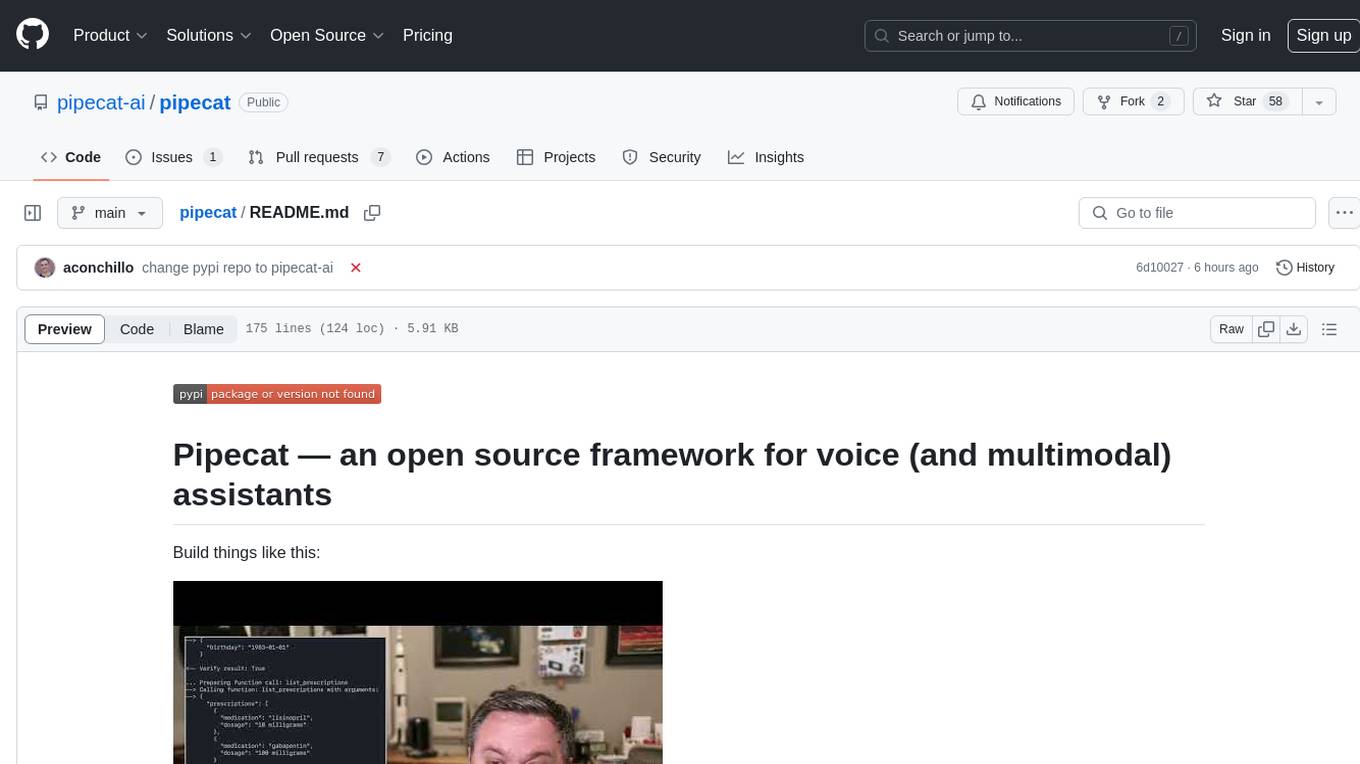
pipecat
Pipecat is an open-source framework designed for building generative AI voice bots and multimodal assistants. It provides code building blocks for interacting with AI services, creating low-latency data pipelines, and transporting audio, video, and events over the Internet. Pipecat supports various AI services like speech-to-text, text-to-speech, image generation, and vision models. Users can implement new services and contribute to the framework. Pipecat aims to simplify the development of applications like personal coaches, meeting assistants, customer support bots, and more by providing a complete framework for integrating AI services.
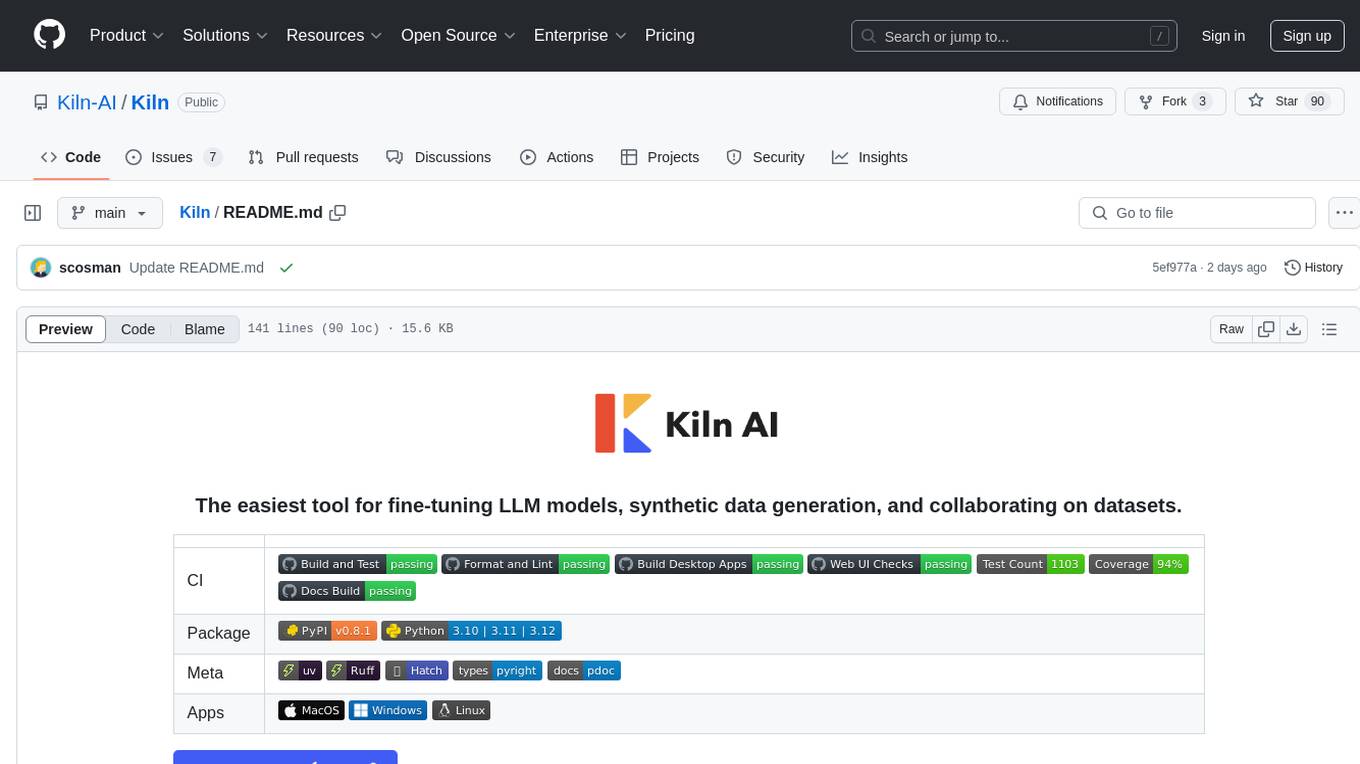
Kiln
Kiln is an intuitive tool for fine-tuning LLM models, generating synthetic data, and collaborating on datasets. It offers desktop apps for Windows, MacOS, and Linux, zero-code fine-tuning for various models, interactive data generation, and Git-based version control. Users can easily collaborate with QA, PM, and subject matter experts, generate auto-prompts, and work with a wide range of models and providers. The tool is open-source, privacy-first, and supports structured data tasks in JSON format. Kiln is free to use and helps build high-quality AI products with datasets, facilitates collaboration between technical and non-technical teams, allows comparison of models and techniques without code, ensures structured data integrity, and prioritizes user privacy.

anything-llm
AnythingLLM is a full-stack application that enables you to turn any document, resource, or piece of content into context that any LLM can use as references during chatting. This application allows you to pick and choose which LLM or Vector Database you want to use as well as supporting multi-user management and permissions.
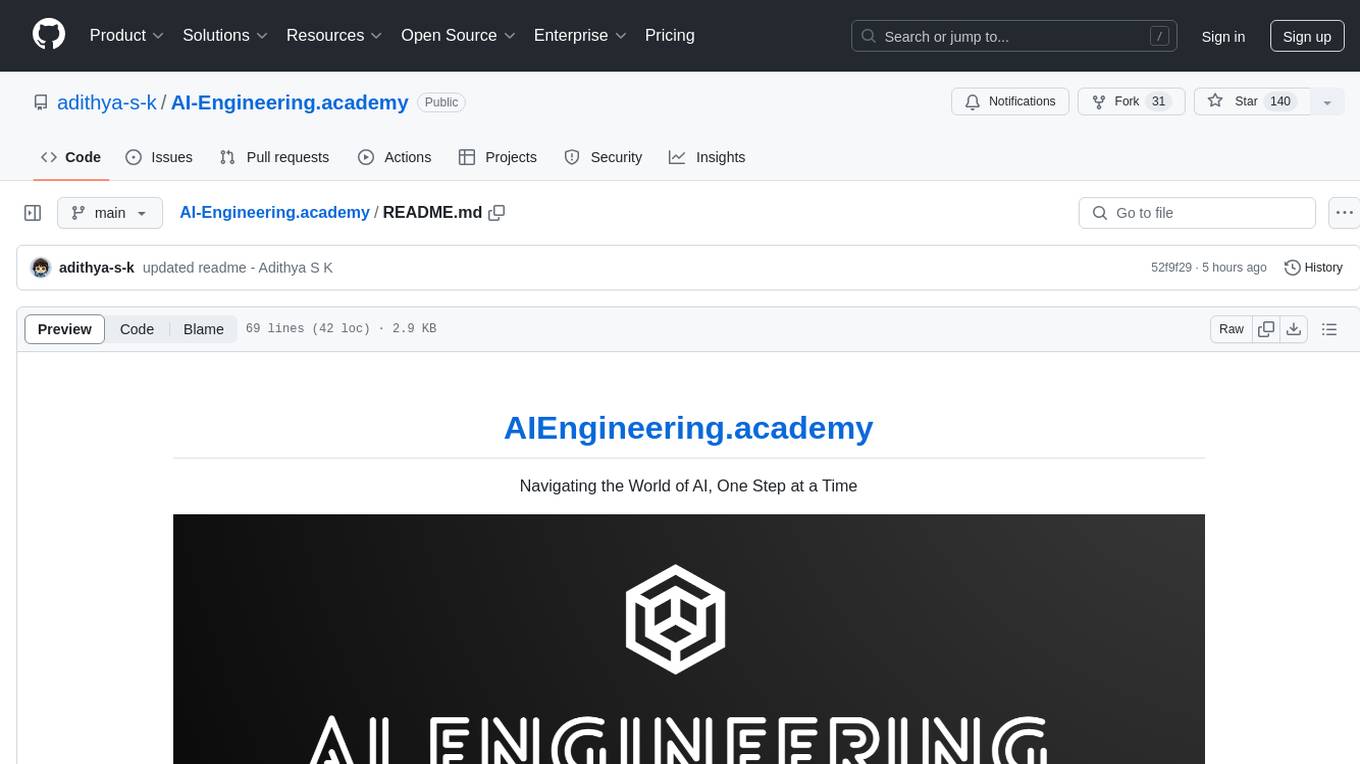
AI-Engineering.academy
AI Engineering Academy aims to provide a structured learning path for individuals looking to learn Applied AI effectively. The platform offers multiple roadmaps covering topics like Retrieval Augmented Generation, Fine-tuning, and Deployment. Each roadmap equips learners with the knowledge and skills needed to excel in applied GenAI. Additionally, the platform will feature Hands-on End-to-End AI projects in the future.
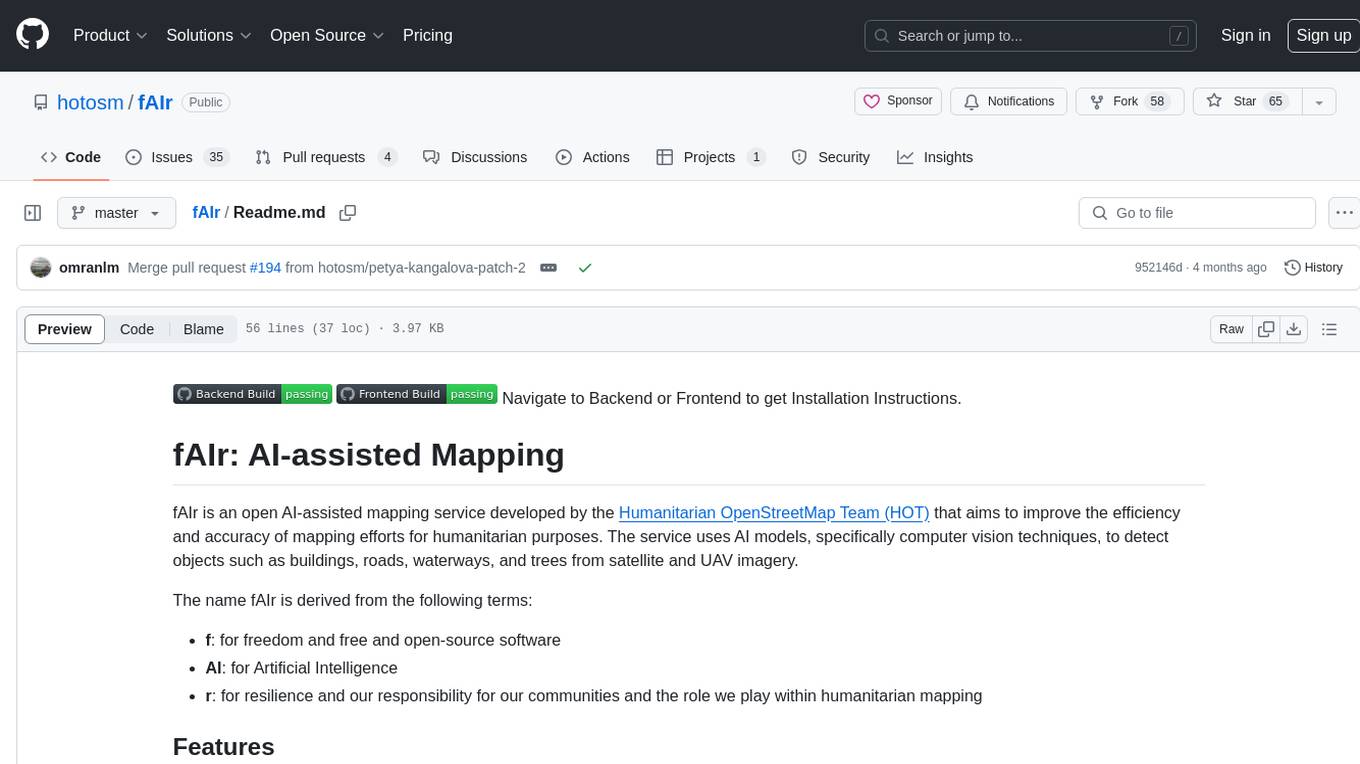
fAIr
fAIr is an open AI-assisted mapping service developed by the Humanitarian OpenStreetMap Team (HOT) to improve mapping efficiency and accuracy for humanitarian purposes. It uses AI models, specifically computer vision techniques, to detect objects like buildings, roads, waterways, and trees from satellite and UAV imagery. The service allows OSM community members to create and train their own AI models for mapping in their region of interest and ensures models are relevant to local communities. Constant feedback loop with local communities helps eliminate model biases and improve model accuracy.
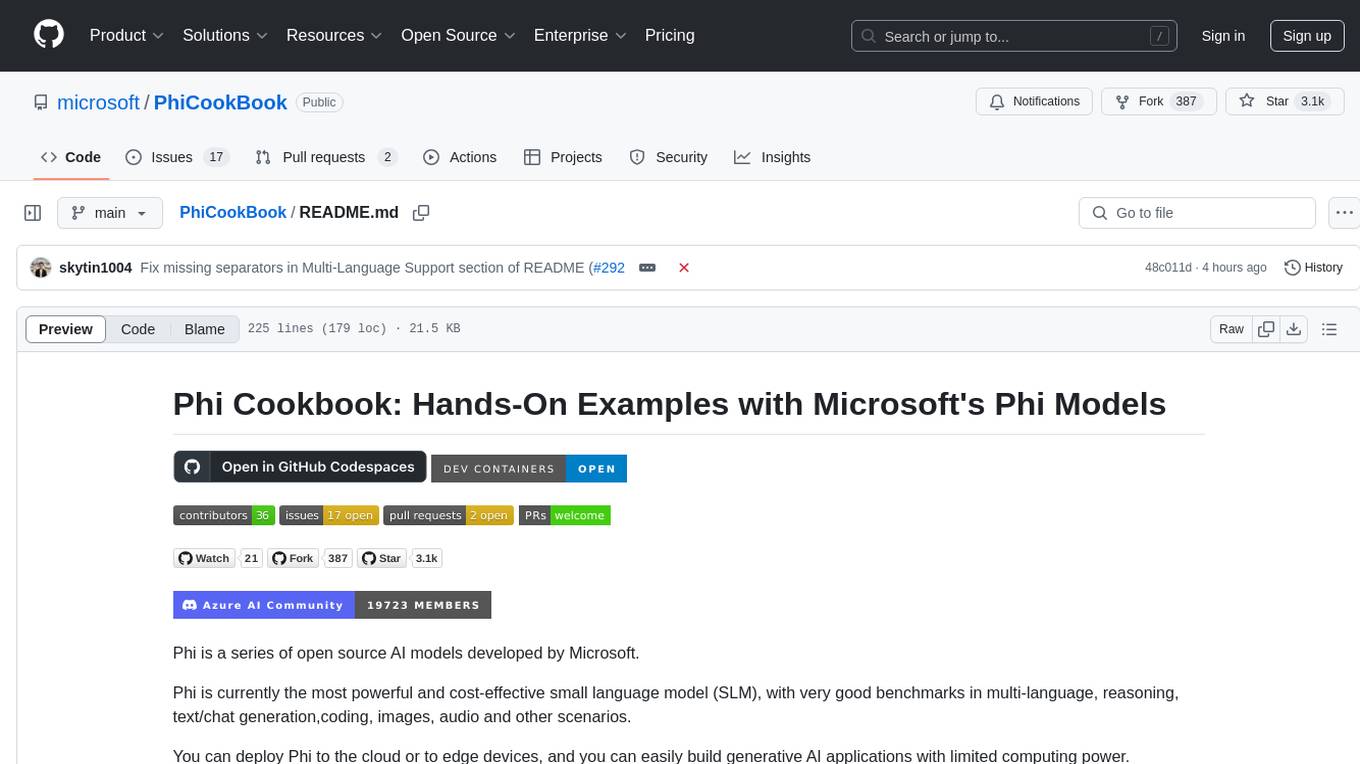
PhiCookBook
Phi Cookbook is a repository containing hands-on examples with Microsoft's Phi models, which are a series of open source AI models developed by Microsoft. Phi is currently the most powerful and cost-effective small language model with benchmarks in various scenarios like multi-language, reasoning, text/chat generation, coding, images, audio, and more. Users can deploy Phi to the cloud or edge devices to build generative AI applications with limited computing power.
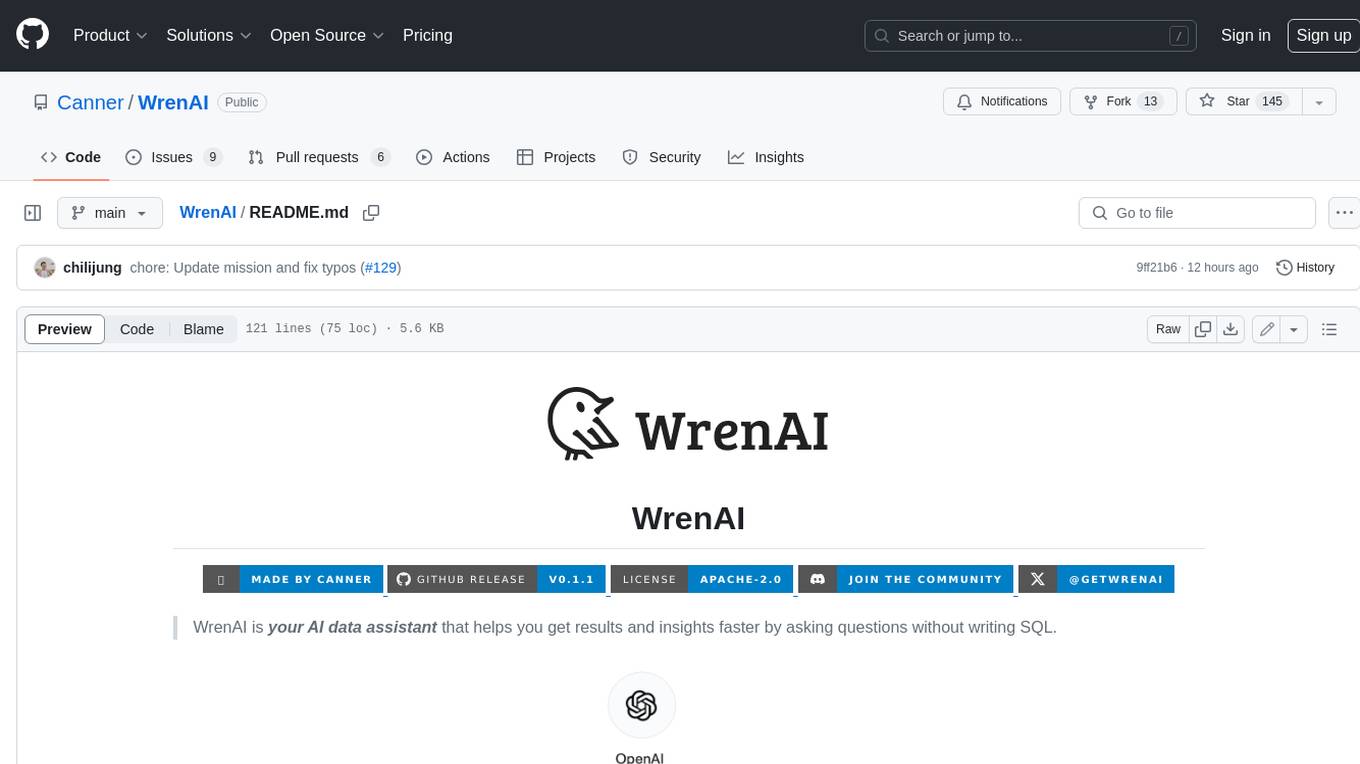
WrenAI
WrenAI is a data assistant tool that helps users get results and insights faster by asking questions in natural language, without writing SQL. It leverages Large Language Models (LLM) with Retrieval-Augmented Generation (RAG) technology to enhance comprehension of internal data. Key benefits include fast onboarding, secure design, and open-source availability. WrenAI consists of three core services: Wren UI (intuitive user interface), Wren AI Service (processes queries using a vector database), and Wren Engine (platform backbone). It is currently in alpha version, with new releases planned biweekly.

SillyTavern
SillyTavern is a user interface you can install on your computer (and Android phones) that allows you to interact with text generation AIs and chat/roleplay with characters you or the community create. SillyTavern is a fork of TavernAI 1.2.8 which is under more active development and has added many major features. At this point, they can be thought of as completely independent programs.
For similar tasks

Generative-AI-for-beginners-dotnet
Generative AI for Beginners .NET is a hands-on course designed for .NET developers to learn how to build Generative AI applications. The repository focuses on real-world applications and live coding, providing fully functional code samples and integration with tools like GitHub Codespaces and GitHub Models. Lessons cover topics such as generative models, text generation, multimodal capabilities, and responsible use of Generative AI in .NET apps. The course aims to simplify the journey of implementing Generative AI into .NET projects, offering practical guidance and references for deeper theoretical understanding.
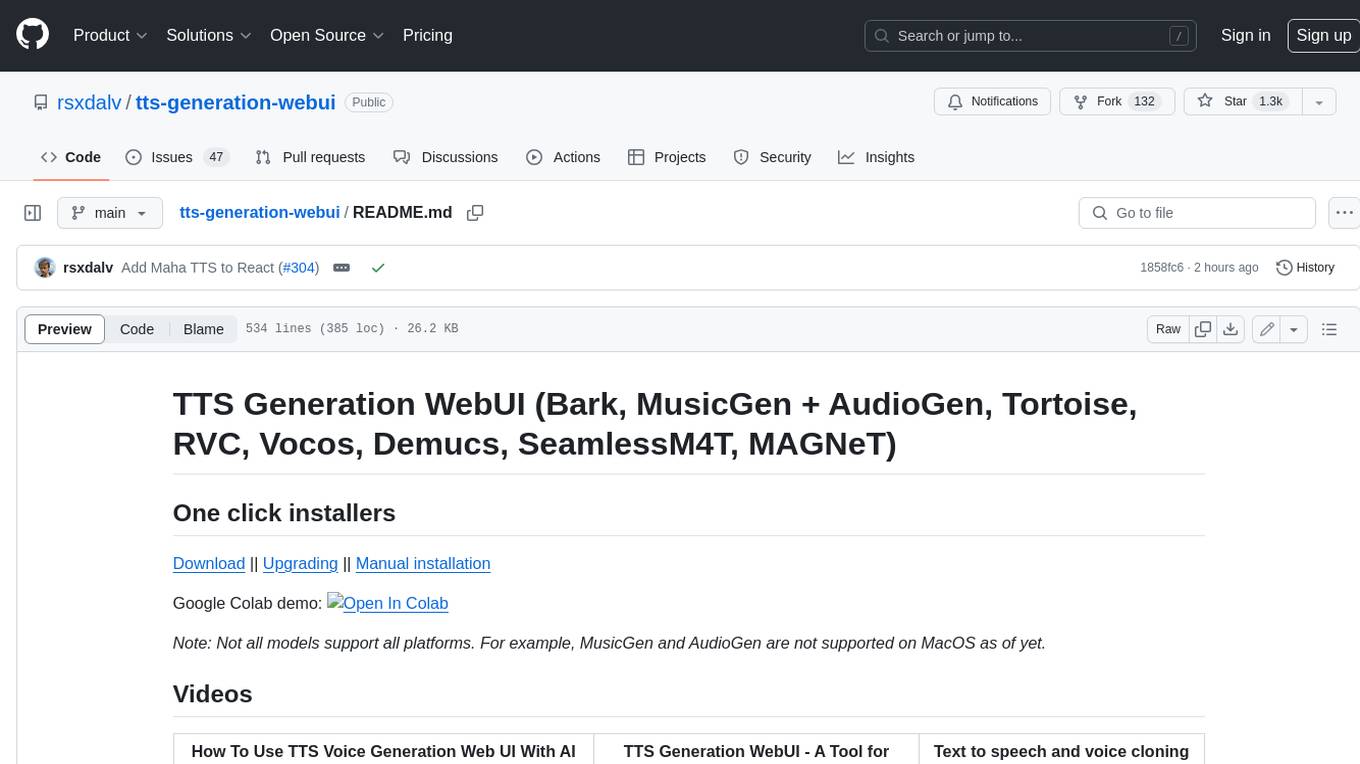
tts-generation-webui
TTS Generation WebUI is a comprehensive tool that provides a user-friendly interface for text-to-speech and voice cloning tasks. It integrates various AI models such as Bark, MusicGen, AudioGen, Tortoise, RVC, Vocos, Demucs, SeamlessM4T, and MAGNeT. The tool offers one-click installers, Google Colab demo, videos for guidance, and extra voices for Bark. Users can generate audio outputs, manage models, caches, and system space for AI projects. The project is open-source and emphasizes ethical and responsible use of AI technology.
For similar jobs

sweep
Sweep is an AI junior developer that turns bugs and feature requests into code changes. It automatically handles developer experience improvements like adding type hints and improving test coverage.

teams-ai
The Teams AI Library is a software development kit (SDK) that helps developers create bots that can interact with Teams and Microsoft 365 applications. It is built on top of the Bot Framework SDK and simplifies the process of developing bots that interact with Teams' artificial intelligence capabilities. The SDK is available for JavaScript/TypeScript, .NET, and Python.

ai-guide
This guide is dedicated to Large Language Models (LLMs) that you can run on your home computer. It assumes your PC is a lower-end, non-gaming setup.

classifai
Supercharge WordPress Content Workflows and Engagement with Artificial Intelligence. Tap into leading cloud-based services like OpenAI, Microsoft Azure AI, Google Gemini and IBM Watson to augment your WordPress-powered websites. Publish content faster while improving SEO performance and increasing audience engagement. ClassifAI integrates Artificial Intelligence and Machine Learning technologies to lighten your workload and eliminate tedious tasks, giving you more time to create original content that matters.

chatbot-ui
Chatbot UI is an open-source AI chat app that allows users to create and deploy their own AI chatbots. It is easy to use and can be customized to fit any need. Chatbot UI is perfect for businesses, developers, and anyone who wants to create a chatbot.

BricksLLM
BricksLLM is a cloud native AI gateway written in Go. Currently, it provides native support for OpenAI, Anthropic, Azure OpenAI and vLLM. BricksLLM aims to provide enterprise level infrastructure that can power any LLM production use cases. Here are some use cases for BricksLLM: * Set LLM usage limits for users on different pricing tiers * Track LLM usage on a per user and per organization basis * Block or redact requests containing PIIs * Improve LLM reliability with failovers, retries and caching * Distribute API keys with rate limits and cost limits for internal development/production use cases * Distribute API keys with rate limits and cost limits for students

uAgents
uAgents is a Python library developed by Fetch.ai that allows for the creation of autonomous AI agents. These agents can perform various tasks on a schedule or take action on various events. uAgents are easy to create and manage, and they are connected to a fast-growing network of other uAgents. They are also secure, with cryptographically secured messages and wallets.

griptape
Griptape is a modular Python framework for building AI-powered applications that securely connect to your enterprise data and APIs. It offers developers the ability to maintain control and flexibility at every step. Griptape's core components include Structures (Agents, Pipelines, and Workflows), Tasks, Tools, Memory (Conversation Memory, Task Memory, and Meta Memory), Drivers (Prompt and Embedding Drivers, Vector Store Drivers, Image Generation Drivers, Image Query Drivers, SQL Drivers, Web Scraper Drivers, and Conversation Memory Drivers), Engines (Query Engines, Extraction Engines, Summary Engines, Image Generation Engines, and Image Query Engines), and additional components (Rulesets, Loaders, Artifacts, Chunkers, and Tokenizers). Griptape enables developers to create AI-powered applications with ease and efficiency.








